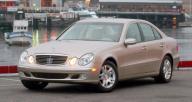2004 Detroit Auto Show: Mercedes-Benz Debuts High-Tech Diesel Car for U.S. Market
 |
Quiet, Powerful Engine to Change Perceptions About Diesel
DETROIT, Jan. 5 -- Mercedes-Benz, the company that invented the diesel car, is debuting a new diesel-powered car for the U.S. market. Beginning this spring, the company will market an E320 CDI, a highly fuel-efficient diesel version of its successful E-Class sedan. The new E-Class diesel is on display during the North American International Auto Show at the Cobo Center in Detroit, January 10-19, 2004.
Electronic Fuel Injection's the Key
The new high-torque diesel engine is quiet and gets impressive fuel mileage, also achieving lower exhaust emissions than previous diesels. The turbocharged six-cylinder powerplant will feature full electronic fuel injection, considered technically impossible on a diesel until only a few years ago. CDI stands for Common-rail Diesel Injection -- a term denoting the fuel line loop supplying constant, very high fuel pressure (up to 23,000 psi) to each of the six solenoid injector valves. Relying purely on the heat of highly compressed intake air to ignite the fuel, diesel engines operate without spark plugs or other ignition parts.
The leap to electronic fuel injection means that the E320 CDI engine can be cleaner, quieter and more powerful than conventional mechanically-injected diesel engines. Diesel powerplants inherently produce 30 percent lower carbon dioxide emissions and significantly lower carbon monoxide than gasoline engines, but historically, diesels have produced more oxides of nitrogen and soot or particulates. However, with precise electronic control of fuel delivery, hand in hand with an oxidation catalyst, the E320 CDI can pass current 45-state emissions standards. When low-sulphur diesel fuel becomes available in the U.S. late 2006, Mercedes-Benz engineers are optimistic that the CDI diesel can meet emissions standards in all 50 states.
The Global Leader in Diesel Cars
Mercedes-Benz debuted the world's first diesel passenger car -- the 260D -- in 1936, and on a global basis, diesel engines power about 40 percent of Mercedes cars around the world. In the 1980s, more than 75 percent of the Mercedes-Benz cars sold in the U.S. market were diesel-powered, but in the 1990s, diesel cars became a smaller and smaller part of the company's product mix. Mercedes-Benz last offered a diesel car -- the E300 Turbodiesel -- in 1999.
Over 30 Percent Better Fuel Mileage
Diesel engines consistently provide more than 30 percent better fuel efficiency than comparable gasoline engines, which means that a full-size luxury sedan such as the Mercedes-Benz E-Class can achieve more than 30 miles per gallon on the highway and cruise about 700 miles before refueling.
The latest generation of electronically-injected CDI engines is likely to change consumers' dated perceptions about diesel engines. With surprisingly good performance, low exhaust emissions and great fuel economy, electronic control of diesel fuel injection even makes it possible to soften the power pulses and help make the diesel nearly as quiet as a gasoline engine, even during idle conditions.
CDI diesel technology will help expand the company's already broad product portfolio in the U.S. market. In addition, Mercedes-Benz' pioneering role in alternative powertrain development means that its modern diesel engine is likely to play a key role in the company's future products that could include hybrids and fuel cells as well as advanced piston engines.
About Mercedes-Benz USA
Mercedes-Benz USA is responsible for sales and marketing in the U.S. of all Mercedes-Benz cars and sport utility vehicles as well as the Maybach super-luxury sedan. Headquartered in Montvale, NJ near New York City, MBUSA employs approximately 1,500 people in 20 locations across the U.S. The company sold 213,225 vehicles in 2002 through a nationwide network of over 300 retailers in the U.S., setting an all-time sales record.


